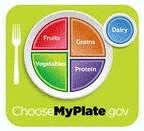Nutrition and Health Sciences, Department of

Department of Nutrition and Health Sciences: Dissertations, Theses, and Student Research
Date of this Version
4-2013
Document Type
Thesis
Abstract
Studies estimate 82% of children less than six years of age in the United States are enrolled in non-parental care outside of their home (1). In Nebraska 4,106 child care providers hold licensure (2). This unique child care environment offers opportunity to address food related challenges facing young children. The purpose of this study is to assess the nutrition and physical activity practices provided for children, self-efficacy, and perceived needs of child care providers across Nebraska. A gap in knowledge exist for practices of child care providers in Nebraska and the impact of Child and Adult Care Food Program (CACFP), Nutrition and Physical Activity Self-Assessment for Child Care (NAP SACC), and I Am Moving, I Am Learning (IMIL) on nutrition and physical activity practices provided to children in Nebraska child care. Participants included a stratified random sample of 1,000 licensed child care providers across Nebraska. A mail survey was sent to the sample of providers. Data was analyzed using SPSS Version 21. The preferred methods of training included use of video, computer module training, and book curriculum. Topics most preferred by providers included introducing foods to picky eaters, preventing food waste, and physical activity planning. Statistical differences were observed between child care centers and home care participants, CACFP and non CACFP participants, NAP SACC and non NAP SACC participants, and IMIL and non IMIL Participants. Many participants are meeting recommended guidelines. Nutrition education, nutrition policy, milk offered for children 12 to 24 months, physical activity policy, and physical activity education were found to be areas for improvement. Utilizing nutrition and physical activity programs may assist child care providers in improving nutrition and physical activity behaviors in children and families. In order to impact Nebraska children more comprehensive regulations at a state level may need to be considered. A variety of training methods should be available to best accommodate the needs of all providers in Nebraska.
Advisor: Julie Ann Albrecht
Included in
Dietetics and Clinical Nutrition Commons, Pre-Elementary, Early Childhood, Kindergarten Teacher Education Commons


Comments
A thesis Presented to the Faculty of The Graduate College at the University of Nebraska In Partial Fulfillment of Requirements For the Degree of Master of Science, Major: Nutrition and Health Sciences, Under the Supervision of Professor Julie Ann Albrecht. Lincoln, Nebraska: April, 2013
Copyright 2013 Tracy C. Delaney